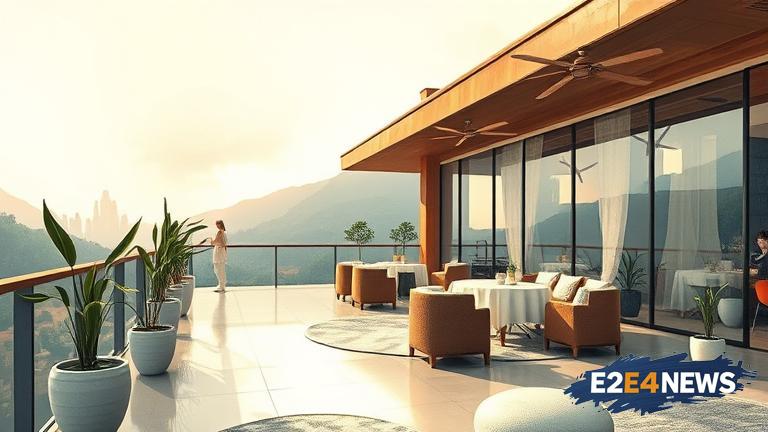The hospitality industry has been witnessing a paradigm shift in recent years, with a growing emphasis on sustainability and technological advancements. This transformation is driven by the increasing awareness of environmental concerns and the need to reduce carbon footprint. Hotels and resorts are now incorporating eco-friendly practices, such as energy-efficient systems, waste reduction, and sustainable sourcing, to minimize their impact on the environment. Moreover, the integration of technology has revolutionized the guest experience, with the implementation of mobile check-in, digital concierge services, and personalized entertainment systems. The use of artificial intelligence and machine learning algorithms has also enabled hotels to analyze guest preferences and behavior, allowing for tailored marketing strategies and improved customer satisfaction. Furthermore, the rise of the sharing economy and online booking platforms has disrupted traditional hospitality models, with travelers seeking unique and authentic experiences. In response, hotels are now offering experiential packages and partnering with local businesses to provide guests with immersive cultural experiences. The incorporation of virtual and augmented reality technologies is also enhancing the guest experience, allowing travelers to explore destinations and properties remotely. Additionally, the growth of the luxury hospitality market has led to the development of high-end sustainable properties, featuring eco-friendly amenities and services. The adoption of sustainable practices has also become a key differentiator for hotels, with travelers increasingly prioritizing environmental responsibility when making booking decisions. As a result, hotels are now investing in sustainability reporting and certification programs, such as the International Organization for Standardization (ISO) 14001, to demonstrate their commitment to environmental stewardship. The hospitality industry is also witnessing a surge in innovation, with the development of new technologies and business models. For instance, the rise of pod hotels and micro-hotels is providing affordable and sustainable accommodation options for budget-conscious travelers. Moreover, the growth of the wellness tourism market has led to the creation of specialized wellness resorts and programs, focusing on holistic health and wellness. The incorporation of biophilic design principles is also becoming increasingly popular, with hotels incorporating natural elements and materials to create calming and restorative environments. Furthermore, the use of data analytics and market research is enabling hotels to better understand guest preferences and behavior, allowing for targeted marketing strategies and improved operational efficiency. The hospitality industry is also experiencing a shift towards greater transparency and accountability, with the adoption of sustainable procurement practices and supply chain management. As the industry continues to evolve, it is likely that we will see even more innovative and sustainable solutions emerge, transforming the hospitality landscape and enhancing the guest experience. The future of hospitality will be shaped by the intersection of technology, sustainability, and guest experience, with hotels and resorts that prioritize these elements likely to thrive in a rapidly changing market. In conclusion, the hospitality industry is undergoing a significant transformation, driven by the adoption of sustainable practices and technological innovations. As the industry continues to evolve, it is essential for hotels and resorts to prioritize sustainability, technology, and guest experience to remain competitive and meet the evolving needs of travelers.





